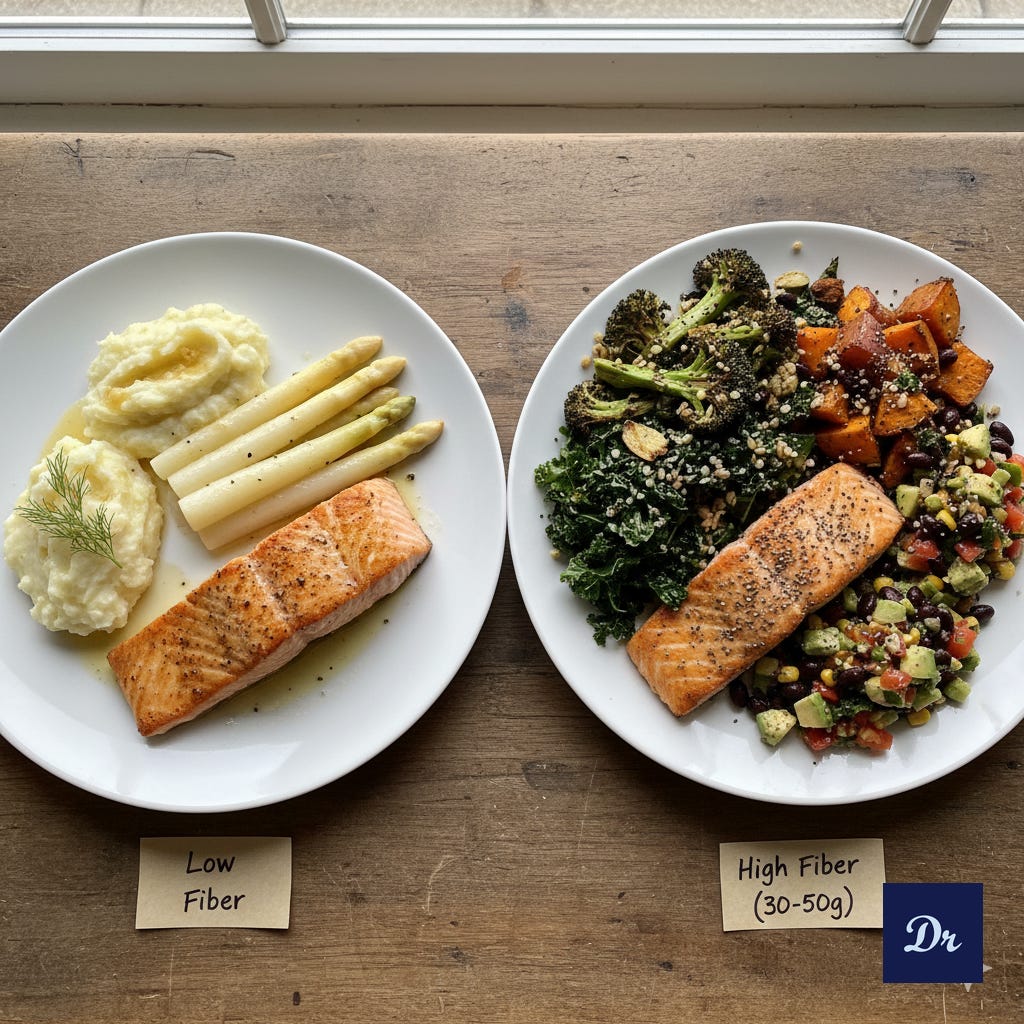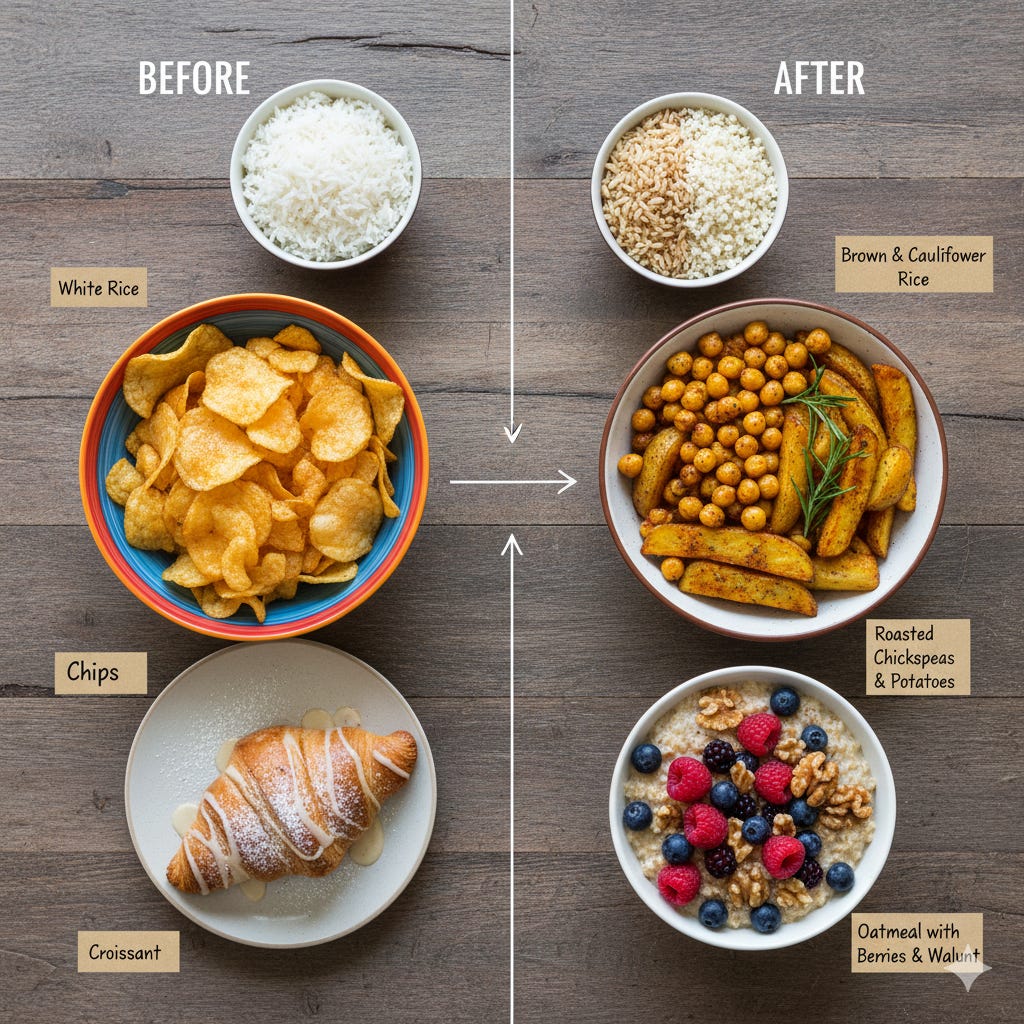The 5 Habits I Teach Every Patient
These are the 5 most powerful skills you can learn that'll keep you healthy, free of disease, and out of the ER & hospital.
Health isn’t just about good luck. These 5 repeatable habits don’t need a full life overhaul. You can start them fresh every day.
I’m Dr. Ashori, a family medicine doctor turned health coach. I help busy adults in their 30s and 40s age well without distraction from the latest health fads.
1. Agency, Believe Your Actions Matter
Why it works: People who believe their choices drive outcomes take the steps that prevent disease. Agency turns “hope” into “action.”
Do you believe that you can prevent dementia? If so, your actions will have a much higher chance of success. We call this “patient empowerment” in medicine.
Do this today:
Pick a health goal for the next 30 days. Keep it specific. Example: “Walk 10 minutes after dinner.”
List 2 obstacles and 1 workaround for each. Example: Rain → mall walk. Late meeting → 5 minutes + stairs.
Put your goal on the calendar like a meeting.
Coach prompt to paste into AI:
Act as my health coach. Ask 3 questions to uncover my biggest constraint this month and give me one tiny action I can do daily.
2. Add Fiber and Complex Carbs
Why it works: Fiber feeds your gut, secretes short chain fatty acids, blunts glucose spikes, lowers cholesterol, improves mood, decreases inflammation, and keeps you full on fewer calories.
Daily target: 30–50 grams of fiber.
Build your plate:
Base: beans or lentils, intact grains like oats, barley, quinoa, farro, brown rice.
Volume: 2 fists of non-starchy veg — greens, broccoli, cauliflower, peppers.
Flavor: olive oil, herbs, lemon, spices, nuts, seeds.
Easy swaps
White rice → half brown rice, half cauliflower rice.
Chips → roasted chickpeas, oven baked potatoes
Breakfast pastry → oatmeal with berries and walnuts.
AI Coach prompt:
“You’re a nutritionist. I am craving a rich pesto penne pasta. Make me a fiber-forward version that I can prepare quickly - 20 minutes or less. Give a grocery list.”
3. Know Your Risks & Track It
Why it works: What you measure guides what you change. Catching health problems early means that you can intervene without significant harm. We need to know our baseline risk to know which steps to prioritize.
Must-Know Data:
Blood pressure
ApoB + Lp(a)
A1c + fasting glucose
Exercise capacity
Family history red flags
Simple plan
Order or request these labs and a home BP cuff.
Log results in a single note on your phone.
If a value is off, tie it to one habit from this list and recheck in 8–12 weeks.
AI Coach prompt:
“You’re a doctor and here are my health metrics [paste your BP, lipids, A1c, waist, family history, etc.], identify my top 2 modifiable risks and give one habit for each with a 12-week check-in plan. I want to know what to expect over what time period to see change. Troubleshoot with me as needed.”
4. Move Every Day
Why it works: Movement manages glucose, mood, bone health, and blood pressure. It protects joints and prevents dementia.
Daily minimums
Steps: aim for 7,000–10,000 across the day.
Post-meal movement: 5–10 minutes after lunch and dinner.
Mobility: 3–5 minutes hips, ankles, thoracic spine.
Strength: 10-15 squats, wall-pushups, calf raises
Convenient options with less friction:
Phone calls while walking.
10 air squats, 10 pushups on a counter, 30-second plank. Repeat 2X.
Park far on purpose.
Do more house chores.
AI Coach prompt:
“You’re a health coach and personal trainer. I can’t seem to stick to my daily activity goals. I always end up too busy running after the kids and putting out fires at home. Help me troubleshoot and come up with a better plan to incorporate strength, mobility, and stamina.”
5. Sleep & Recovery
Why it works: Sleep and rest is when tissue repair happens. Together they cut injury, diabetes, depression, and inflammation.
Sleep goals:
Restful, restorative sleep, 75% of the time
Dark, cool room
No late meals, caffeine or alcohol
Recovery targets:
Plan less on your weekends
Disconnect from gadgets and your inbasket
After a big argument or exercise session, take time to recover and heal
AI Coach prompts
“Using the principles of the book Hello Sleep help me feel less groggy when I wake up. Give me 3 things I can try over the next 2 weeks until I check in with you again to troubleshoot.”
How to Start This Week
Mon: Write your 30-day goal. Buy a BP cuff & tape measure.
Tue: 10-minute post-dinner walk. Fiber-rich breakfast (oatmeal?).
Wed: 10-minute strength session at home (squats and pushups)
Thu: Pack a fiber-forward lunch. Add carrots & fruit.
Fri: 10-minute strength session. Start planning for bed 30 minutes earlier.
Sat/Sun: Long walk with a friend. Batch-cook beans or lentils.
Common Pitfalls
All-or-nothing thinking usually results in burnout. Pick “good enough” and stay consistent. Even the tiniest improvement will have major compounding effects on your health.
Supplements have their place in overall health but are far less effective than good health habits. Increase your fiber, steps, strength, and sleep before deciding on supplementation.
Don’t ignore health data. Don’t track it too much either. But if you’re informed, you’re empowered. Recheck numbers and adjust your plan.
Work With Me
If you want a simple, personalized plan for your numbers, I can help. Book a free Fit Call and we will map your next four weeks together:
If this was useful: Subscribe to get each new article and simple tools for healthy aging.






Great advice, most of all the return of agency to the patient. Thanks! Will share these
Consistency is key! I had a major setback last week with a fall that broke 5 ribs, but I know that bit by bit I have to get back to all the good habits and not give up (I’m 68)